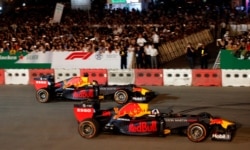Formula 1 car racing will debut next year in Vietnam as the fast-growing host country tries to attract high-end tourism and its own moneyed citizens take an ever keener interest in sports.
A racing circuit is due for completion next month in the capital Hanoi, Formula 1 says on its website. In April, the international car racing event will hold the country’s first Formula 1 Grand Prix.
The race’s arrival in Vietnam, a country racked by widespread poverty and the aftershocks of war 40 years ago, shows that many people have the money as well as the interest to buy tickets and the goods sold by event sponsors, country analysts say.
Hosting Formula 1 races is also expected to stimulate more tourism.
“It’s probably one of the strategies of the government to increase value-added tourism and also to brand the tourism economy in a better way, and then of course Vietnam’s own more upper middle class population would be interested in these types of events,” said Rajiv Biswas, Asia-Pacific chief economist at market research firm IHS Markit.
The Vietnam Grand Prix circuit will extend 5.6 kilometers, 1.5 kilometers of which will be straight. It will allow speeds of about 335 kilometers per hour.
Formula 1 keen on Vietnam
The race organizer spotted in Vietnam an increasingly market-driven economy experiencing a boom in tourism and a growing local population with a “large and young workforce as well as an increase in disposable income in recent years”, corporate communications head Liam Parker said.
“Hanoi is one of the most exciting cities in the world right now with such a rich history and an incredible future ahead of it,” Parker told VOA. “This is the perfect formula for Grand Prix racing and we believe this will become a real highlight of the F1 calendar.”
Between 2010 and 2018, the number of foreign tourists in Vietnam expanded from 5 million to more than 15 million.
Raising the inbound headcount
Vietnamese officials probably hope Formula 1 will draw more tourists, said Mark Thomas, executive consultant with OmniCom Experiential Group, a marketing firm with expertise in sports. The governments of host countries pay to host the races and build the racing infrastructure.
Vietnam, like China 15 years ago, is an “up-and-coming nation that wants to showcase itself to the world,” Thomas said.
“I sort of think it works for both sides,” he said. “The government gets what they want, which is a global sort of advertising platform for what they are and what they want to become, and Formula 1 and their owners get a nice check.”
Officials probably hope the races will lure high-spending tourists, Biswas said. Some companies would take clients to the races as well to show hospitality, he said.
The races evolved more than a century ago in Europe, were officially inaugurated in 1950 and are managed now by a federation in Paris. Organizers say the world television audience totals 490 million. Around Asia, Formula 1 holds other races in China, Japan and Singapore.
China breaks even on its Shanghai circuit by renting it out between races, Thomas said. Malaysia stopped hosting Formula 1 in 2018 after losing money over 17 years.
Vietnamese automaker VinFast will help the events in Hanoi as the title sponsor.
More money, attention to sports among Vietnamese
More than one-third of Vietnam’s 97 million people will be middle class or more by next year, the Boston Consulting Group forecasts. They’re living better mainly because a boom in export manufacturing has generated new jobs.
Soccer and basketball have already gained followings as people have the money to buy event tickets and goods sold by event sponsors. A Grand Prix ticket costs $30 to $312, depending on the exact event date and location of seats.
“Generally speaking, (the) sports economy is really starting to take root in Vietnam. People in Vietnam love certain sports, especially soccer and now they’re starting to like basketball,” said Frederick Burke, partner with the law firm Baker McKenzie in Ho Chi Minh City.
“Vietnamese now have some leisure time and entertainment is really lacking, and people like to go to these games,” he said. “They do really well.”
Car racing will grab the most attention among expatriates and white-collar Vietnamese men, especially those who already like cars, said Phuong Hong, a Ho Chi Minh City travel sector businessperson. “The upper class of Vietnam, who care about car, about autos, surely they will like this,” she said.
Phuong herself hopes to make it to Hanoi for a Grand Prix.






